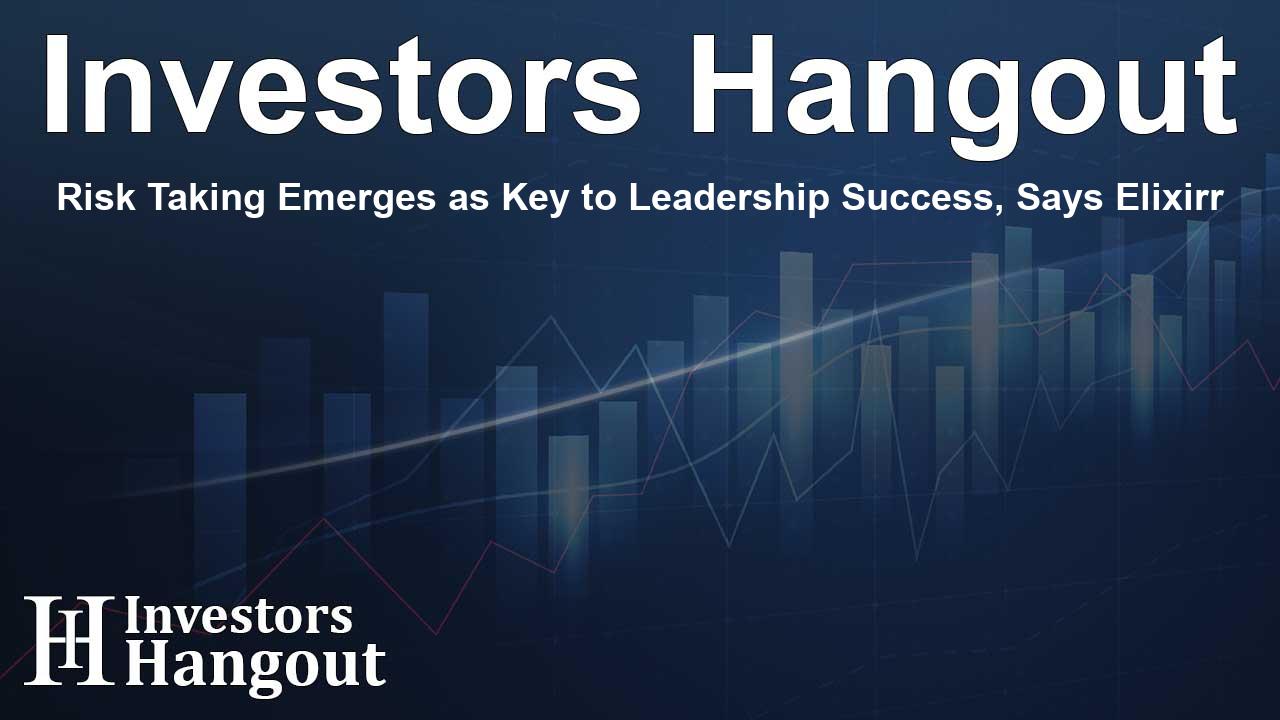Risk Taking Emerges as Key to Leadership Success, Says Elixirr

The Importance of Risk Taking in Leadership
A recent report highlights a significant trend among industry leaders regarding their views on taking risks in business. Many leaders assert that embracing calculated risk is essential for effective leadership. The consultancy firm, Elixirr, has conducted a study revealing profound insights into the minds of successful business leaders, especially during uncertain times.
Elixirr's Groundbreaking Research Findings
Based on a survey of over 500 enterprise leaders across various sectors such as IT, finance, and retail, Elixirr notes that an impressive 86% of these professionals believe that those who take calculated risks often exhibit superior leadership qualities. This statistic reflects a broader understanding that innovation and growth require stepping beyond traditional comfort zones.
Understanding the Shift in Business Strategies
In the last year, over a fifth of leaders have notably shifted their business strategies to capture new revenue opportunities. They're reshaping their operations and adapting to the fast-changing landscape that has characterized recent economic climates. The voices of these leaders resonate with a common theme: business success hinges on the willingness to embrace change and the unknown.
The Balance of Risk and Reward
Taking risks is not merely about daring decisions; it's about intelligent choice-making. Leaders must weigh the potential benefits against the odds of failure. Surprisingly, only 11% of leaders refrained from engaging in any significant risks in the previous year. This willingness to experiment has led to growth stories amid challenging conditions.
Adapting Through Economic Challenges
Businesses are recognizing the importance of adaptation. In a climate marked by economic challenges and shifting political landscapes, leaders are opting for positive action rather than stagnation. For instance, over a third have even restructured entire departments, aiming to better position their organizations for the future.
Investment in Growth
Instead of retracting during adversity, many companies are taking bold steps, with 28% expanding their office spaces. This proactive approach has shown a dedication to growth rather than mere survival during turbulent times.
Leveraging Technology for Competitive Advantage
Innovative thinking goes hand in hand with technological advancement. Leaders are increasingly investing in new technologies as an essential strategy to remain competitive. The report indicates that a considerable majority, 56%, plan to prioritize technology investments going forward.
The Role of Artificial Intelligence
Among these technology advancements, artificial intelligence (AI) stands out as a focal point for many enterprises. A staggering 60% of the surveyed leaders believe AI is their most critical investment area, ahead of other technologies like the Internet of Things or virtual reality.
Building a Future-Ready Workforce
As technology evolves, so does the workforce. Over half of the leaders noted that attracting new talent is essential, particularly talent with the entrepreneurial drive needed to support growth objectives. Addressing the ongoing skills gap remains a top priority for many businesses that aspire to realign with future demands.
Government's Role in Encouraging Innovation
Leading figures in business are calling for better conditions for investment. Many agree that creating a friendly environment for private investors is crucial for fostering innovation, highlighting the need for reduced bureaucratic barriers and sensible tax reforms.
Conclusion: Embracing Risk for Future Success
In summary, the Elixirr report delivers a compelling message: risk taking is an inherent part of effective leadership. The willingness to innovate and adapt is not just advantageous; it's a necessity for businesses aiming to thrive in a rapidly changing landscape. This insight will serve as a guide for leaders who are prepared to embrace the challenges and reap the rewards of taking calculated risks in their endeavors.
Frequently Asked Questions
What percentage of leaders believe risk taking improves leadership?
About 86% of surveyed industry leaders believe that taking calculated risks contributes to better leadership capabilities.
How has the economic climate affected business strategies?
Many leaders have pivoted their business strategies in response to economic uncertainty, with over a fifth having made significant changes to seize new opportunities.
What is the most invested area according to business leaders?
The majority of leaders indicate that they prioritize investment in technology, with AI being a key focus area for many enterprises.
What challenges do businesses face in hiring talent?
Businesses are struggling to find skilled talent, especially in tech, due to the skills gap exacerbated by recent events like Brexit.
What do leaders expect from the government to foster growth?
Leaders expect the government to make conditions more favorable for private investment, focusing on reducing red tape and implementing sensible tax reforms.
About The Author
Contact Riley Hayes privately here. Or send an email with ATTN: Riley Hayes as the subject to contact@investorshangout.com.
About Investors Hangout
Investors Hangout is a leading online stock forum for financial discussion and learning, offering a wide range of free tools and resources. It draws in traders of all levels, who exchange market knowledge, investigate trading tactics, and keep an eye on industry developments in real time. Featuring financial articles, stock message boards, quotes, charts, company profiles, and live news updates. Through cooperative learning and a wealth of informational resources, it helps users from novices creating their first portfolios to experts honing their techniques. Join Investors Hangout today: https://investorshangout.com/
The content of this article is based on factual, publicly available information and does not represent legal, financial, or investment advice. Investors Hangout does not offer financial advice, and the author is not a licensed financial advisor. Consult a qualified advisor before making any financial or investment decisions based on this article. This article should not be considered advice to purchase, sell, or hold any securities or other investments. If any of the material provided here is inaccurate, please contact us for corrections.
